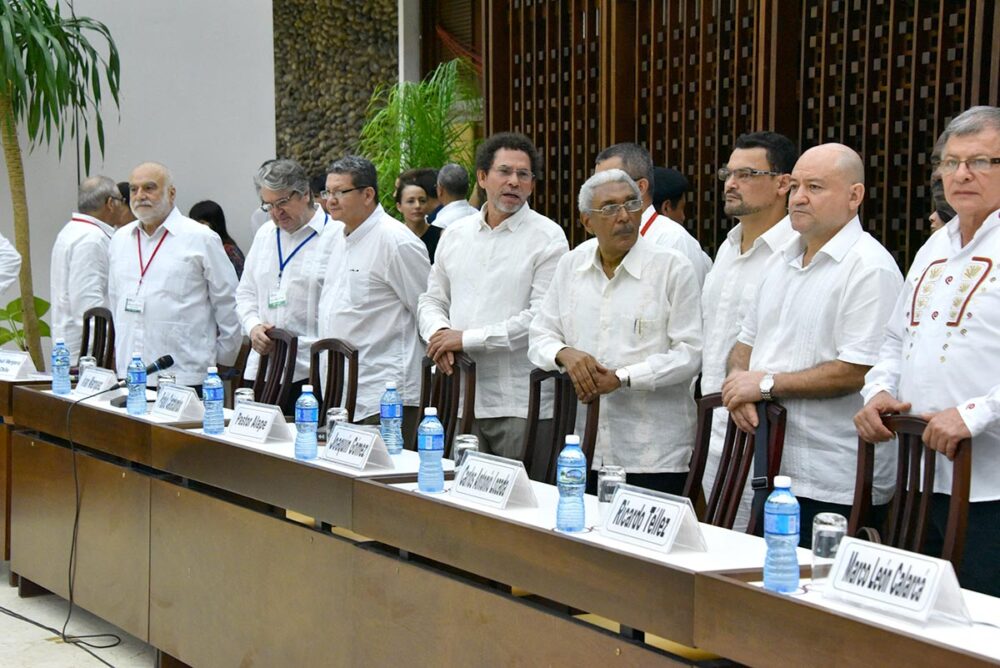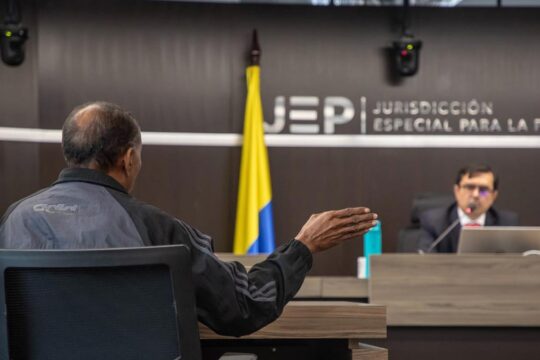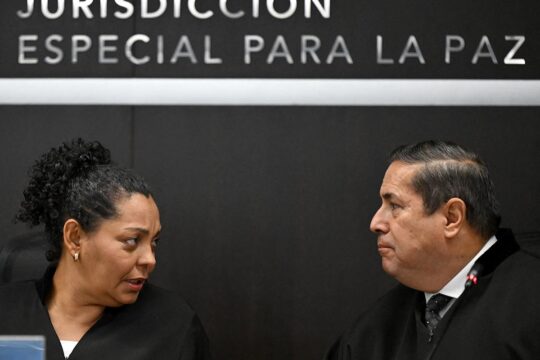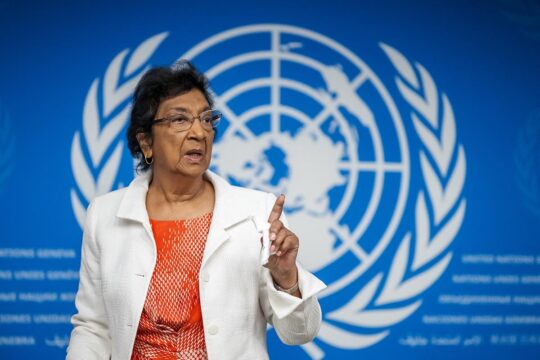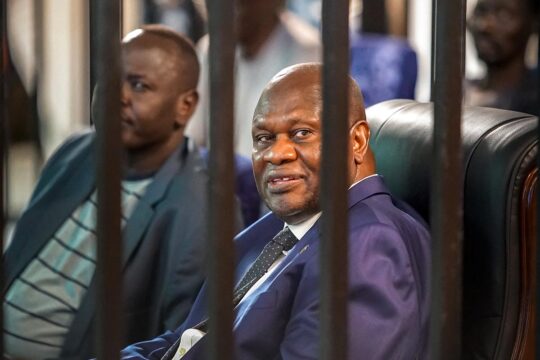Demobilized former top commanders of the Revolutionary Armed Forces of Colombia (FARC) guerrillas recently criticized publicly the Special Jurisdiction for Peace (JEP), the judicial branch of the country’s transitional justice system, claiming that judges were departing from the 2016 peace accord.
Among other critiques listed in two letters sent to President Gustavo Petro and former FARC members between February 7th and 19th, the former commanders raised seemingly preemptive concerns about the “sanctions” that the Special Jurisdiction has yet to impose. Putting in place these sanctions, that is, the penalties that will attach to individual admissions of responsibility, will be a critical test for the credibility of the transitional court system. So, it’s worth reminding the former FARC commanders — and everyone — what Colombia’s peace accord lays out.
Under the peace accord, those responsible for serious abuses who promptly confess to their crimes, tell the truth, and offer reparations will not be subject to prison terms, but to 5 to 8 years of “special sanctions.” Those who fail to cooperate with the justice system or to contribute to victims’ rights, or do so belatedly, may receive between 5 and 20 years in prison.
As the accord made clear, these special sanctions involve a reparative component — consisting of “tasks, work or activities with a reparative content” — and a retributive component of “effective restriction on liberty.” These are not, as the former FARC commanders suggest in their letter, solely “restorative sanctions.”
A “very strict” supervision
While the accord was intentionally ambiguous about the “effective restrictions on liberty,” it detailed several requirements. The accord establishes that there should be “suitable monitoring and supervision mechanisms” by the UN Mission in Colombia and the JEP to ensure the “good faith compliance with the restrictions.” Analyzing JEP’s procedural law, the Constitutional Court said that this supervision should be “very strict” and carried out with “independence and impartiality.”
The original accord was rejected when a slim majority of Colombians voted against it in an October 2016 plebiscite. When the accord was renegotiated, the parties agreed to include additional requirements. Among them, they agreed to “territorial areas” where people serving sentences would stay, as well as to restrict their “place of residence…for as long as the sanction is implemented.” The accord indicates that the “territorial spaces” must have a “maximum size equivalent to the Transitional Local Zones for Normalization,” the areas where FARC members disarmed, which were between 5 and 15 hectares.
The renegotiated accord noted that the JEP is required to authorize “any travel by the sanctioned individual to deal with matters other than complying with the sanction.” The Constitutional Court said that this mechanism should not be “lax or uncontrolled, nor one of liberality,” but should rather “obey very strict and authorized rules.”
The former FARC commanders seem to be worried that the sanctions will be too strict. But, if anything, there’s reason to be concerned that these may be too lenient.
Government, judiciary, UN: who’s prepared?
Colombia appears to lack the necessary preparations to put these sanctions in practice. In rulings regarding both the military and the FARC, the JEP expressed concern about lack of state funding and “institutional support” to carry out the sanctions. The administration of President Petro, who has vowed to carry out the peace accord and urged the Special Jurisdiction to do so too, only included vague references to the special sanctions in its 2022-2026 national development plan.
At the same time, the Special Jurisdiction appears to have dragged its feet in its internal discussions on how to address the ambiguities regarding the sanctions in the accord—and prepare for carrying them out. And the UN Mission in Colombia, which is required to supervise compliance, says it may not supervise all sanctions, but only focus on “trends” and “concrete individual cases.”
Imposing “special sanctions” is challenging — legally, politically, and logistically. But all stakeholders need to take this challenge seriously and without any further delay, as the rights of victims of heinous abuses by both the FARC and the military hinge on it.
The Special Jurisdiction has taken some landmark steps to ensure accountability for these abuses. The judges have charged FARC top commanders of hostage-taking and accused senior members of the military for their responsibility in “false positive” extrajudicial executions. But its credibility as a mechanism seeking to deliver at least a minimal degree of justice for victims of abuses by all parties to the conflict may be seriously damaged if it does not deliver meaningful sanctions.
Avoid misleading messages
Failing to properly implement the special sanctions should raise concerns at the Office of the Prosecutor of the International Criminal Court (ICC), which closed its preliminary examination on Colombia in 2021. In 2017, then prosecutor Fatou Bensouda said in an amicus brief to Colombia’s Constitutional Court that while the Rome Statute does not prescribe a specific “type or length” of sanctions for international crimes, these should seek to serve the general sentencing objectives of “deterrence, retribution, rehabilitation and restitution.” She said that fulfilling these objectives would hinge, among others, on the “effective implementation of the restrictions” and ensuring a “rigorous verification system.”
When current prosecutor Karim Khan closed the examination on Colombia in 2021, he signed a cooperation agreement with the government noting that his office may reconsider the closing of the investigation on the basis of “any significant change in circumstances” including, among others, measures affecting the “enforcement of effective and proportionate penal sanctions of a retributive and restorative nature.”
Failing to properly implement the special sanctions would also send a misleading message to the National Liberation Army (ELN) guerrillas and other armed groups that are currently conducting peace talks with the Colombian government.
Foreign governments that have supported the peace process in Colombia, such as the European Union and the Biden administration, should push for the Special Jurisdiction and the Colombian government to make progress on this critical aspect of the justice component of the accord—and support meaningful efforts to do so.
Respecting the peace accord requires respecting its provisions on sanctions too.

Juanita Goebertus is the Americas director at Human Rights Watch. Between 2012 and 2016, she participated in the Colombian government delegation in the peace talks negotiations that led to the 2016 peace accord.

Juan Pappier is the deputy Americas director at Human Rights Watch, where he conducted research on Colombia between 2016 and 2022.


